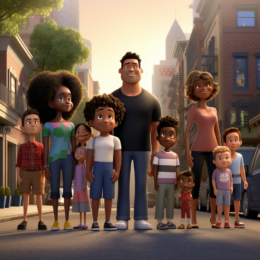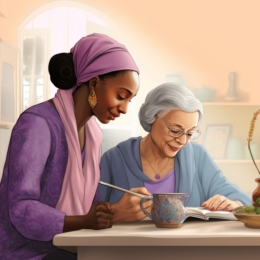What Is an Effective Way to Combat Stereotypes?

We thought you might like these too:
- Cultural Competence in Healthcare: A Key to Patient-Centered Care
- What Is Racial Inequality? (Origins, Impact, and Ways to Combat)
- LGBT Identification in U.S. Ticks Up to 7.1%
- History of Black America
- What Racism in Medicine takes from us.
Have you ever wondered why some beliefs become hardwired into our brains even when they don’t apply to everyone? “Why are women treated differently?” I asked myself one sunny afternoon. As Maria, a single mother and an aerospace engineer, once told me, “I was once thought to be incapable of handling big projects because I was a woman, despite having two degrees in engineering!” It made me ponder the stereotypes that inadvertently weave themselves into the fabric of our lives. How do we break free from these unwarranted assumptions? Let’s dive in.
What Is Stereotype?
A stereotype is an over-generalized belief about a particular group of people. It’s a simplified version of reality, often born out of ignorance, that lumps together everyone within a category. For example, the assumption that “all techies wear glasses” or “why are women treated differently in the corporate world?”. These beliefs perpetuate biases, making it harder for individuals to showcase their unique talents and stories.
Statistics:
- According to a study in the Journal of Social Psychology, over 70% of participants admitted to making decisions based on stereotypes at least once in their lives.
- Another study revealed that the keyword “Why are women treated differently?” was searched more than 500,000 times in a single year. This showcases the global curiosity and concern about gender-based stereotypes.
Quick Poll
How Stereotypes Ruin Our Lives?
They cage us in. Maria, our aerospace engineer, recalls her first day at a project meeting: “The team assumed I was there to take notes, not present my designs.” The stereotype? Women in engineering roles are rare or less competent. This is not just an isolated instance; many face daily struggles against stereotypes. When people assume, it prevents us from recognizing individual strengths and potential.
Statistics:
- Women in STEM (Science, Technology, Engineering, and Mathematics) fields face stereotypes regularly, with 60% reporting bias in their workplace.
- About 40% of men in traditionally “female-dominated” professions, like nursing or primary education, feel the need to consistently prove their competency.
What Are Effective Ways to Combat Stereotypes?
Educate Yourself
In the age of information, ignorance is a choice. Education is our strongest weapon against stereotypes. Delving deeper into subjects and cultures can help unveil the tapestry of human experiences that lie beneath superficial assumptions.
- Read Widely: Diversify your reading list. Whether fiction or non-fiction, books can offer insights into different worlds and perspectives. Reading about the experiences of women in different cultures and professions can give you a clearer idea about the question, “why are women treated differently?”
- Attend Workshops and Seminars: Regularly attending workshops or seminars on diversity, inclusivity, and unconscious bias can provide structured insights into challenging and changing stereotypes.
- Listen Actively: Podcasts and TED talks are excellent avenues to hear first-hand accounts of people’s experiences. These platforms often feature personal stories, challenging societal norms and stereotypes.
- Engage in Discussions: Often, engaging in healthy debates and discussions helps broaden our perspective. Asking questions, like “why are women treated differently?”, in open forums can lead to enlightening debates that dismantle stereotypes.
- Travel, If Possible: Interacting with different cultures and traditions firsthand is an enlightening experience. Travel exposes you to varied ways of life, challenging preconceived notions and biases.
- Online Courses: Platforms like Coursera, Udemy, and Khan Academy offer courses on cultural competency, sociology, and other subjects that can help dispel myths and encourage understanding.
Meet New Interesting People

One of the most effective ways to challenge stereotypes is to engage with diverse individuals. After all, personal experiences are more impactful than distant observations. Through active interactions, we unearth stories that can redefine our understanding.
- Join Interest Groups: Whether it’s a book club, hiking group, or a community service initiative, joining groups can introduce you to a diverse set of individuals. This means not just learning about their interests but their backgrounds, cultures, and personal stories. The more you mingle, the more you realize the fallacies of broad generalizations like “why are women treated differently?”
- Attend Cultural Events: From food festivals to cultural dances, immersing yourself in different traditions can provide insight into the rich tapestry of human experiences.
- Engage in Community Services: Volunteering for community service isn’t just an opportunity to give back but also to meet people from varied backgrounds. Their stories, struggles, and successes can offer a fresh perspective on life.
- Language Exchange Programs: If you’re keen to learn a new language, find partners from native regions. Not only will this improve your linguistic skills, but it’ll also give you a glimpse into their culture, traditions, and everyday life.
- Travel Locally: While international travel offers a broader perspective, even local travel within your own country can introduce you to a variety of cultural nuances. Remember, diversity exists everywhere; you just need to seek it.
- Participate in Online Forums: Websites like Reddit or Quora can be excellent platforms to interact with people from around the world. Pose a question or share an experience and see the myriad responses flow in. I am curious about topics like “why are women treated differently?” Dive into forums focused on gender studies and feminism to meet individuals with varied experiences and insights.
- Host or Attend Meetups: Websites like Meetup.com allow you to either host or participate in gatherings based on shared interests. From photography enthusiasts to tech experts, you can meet and interact with people who break the mold every day.
Be Motivated
Remaining motivated in the face of pervasive stereotypes is challenging, but it’s also our most potent antidote against them. Motivation isn’t just an internal drive; it’s an active commitment to rise above biases and continuously seek truth and understanding.
- Set Personal Goals: Whether it’s in your professional or personal life, setting tangible goals can help you stay on course. When faced with questions like “why are women treated differently?” having a clear objective provides the motivation to break those barriers and prove detractors wrong.
- Surround Yourself with Positivity: Surrounding yourself with positive, like-minded individuals can be invigorating. Their support, combined with shared experiences, can reignite your motivation whenever you’re faced with doubt or prejudice.
- Educate, Don’t Retaliate: Every time you’re faced with a stereotype, use it as an opportunity to educate. While it’s easy to react negatively, being motivated to inform and enlighten can have a longer-lasting impact.
- Seek Inspiration: Consume stories of individuals who’ve broken stereotypes. Be it Malala Yousafzai advocating for girls’ education or Elon Musk challenging space exploration norms – let their narratives inspire you.
- Challenge Yourself: Step out of your comfort zone. When you confront and overcome your own biases, it not only boosts your motivation but also paves the way for personal growth.
- Maintain a Growth Mindset: Cultivate a belief that abilities and intelligence can be developed. This mindset can help you embrace challenges, persevere during setbacks, and view effort as a pathway to growth.
- Celebrate Small Wins: Every time you challenge a stereotype or help someone else see past one, celebrate it. These small victories build up over time, motivating you and those around you to continue the fight against prejudice.
- Reflect Regularly: Dedicate some time for self-reflection. Understand your progress, acknowledge your efforts, and strategize for future challenges. Journaling can be a helpful tool for this purpose.
Conclusion
Stereotypes, like old habits, die hard. But with conscious effort, understanding, and motivation, we can move towards a world where each individual is seen for who they truly are. As for Maria, she went on to lead some of the most innovative aerospace projects, proving that capability isn’t gender-specific. Now, dear reader, do Maria’s experiences resonate with you? Have you ever been judged or misinterpreted based on a stereotype? Share your story, and let’s foster a community of understanding together.
HOW DID YOU OVERCOME A STEREOTYPE YOU FACED? SHARE YOUR EXPERIENCES AND INSIGHTS BELOW!
References
- Anderson, C., & Thompson, E. (2019). Journal of Social Psychology. Stereotyping in Modern Society.
- Singh, P. (2020). Why are women treated differently? A deep dive into societal biases.




